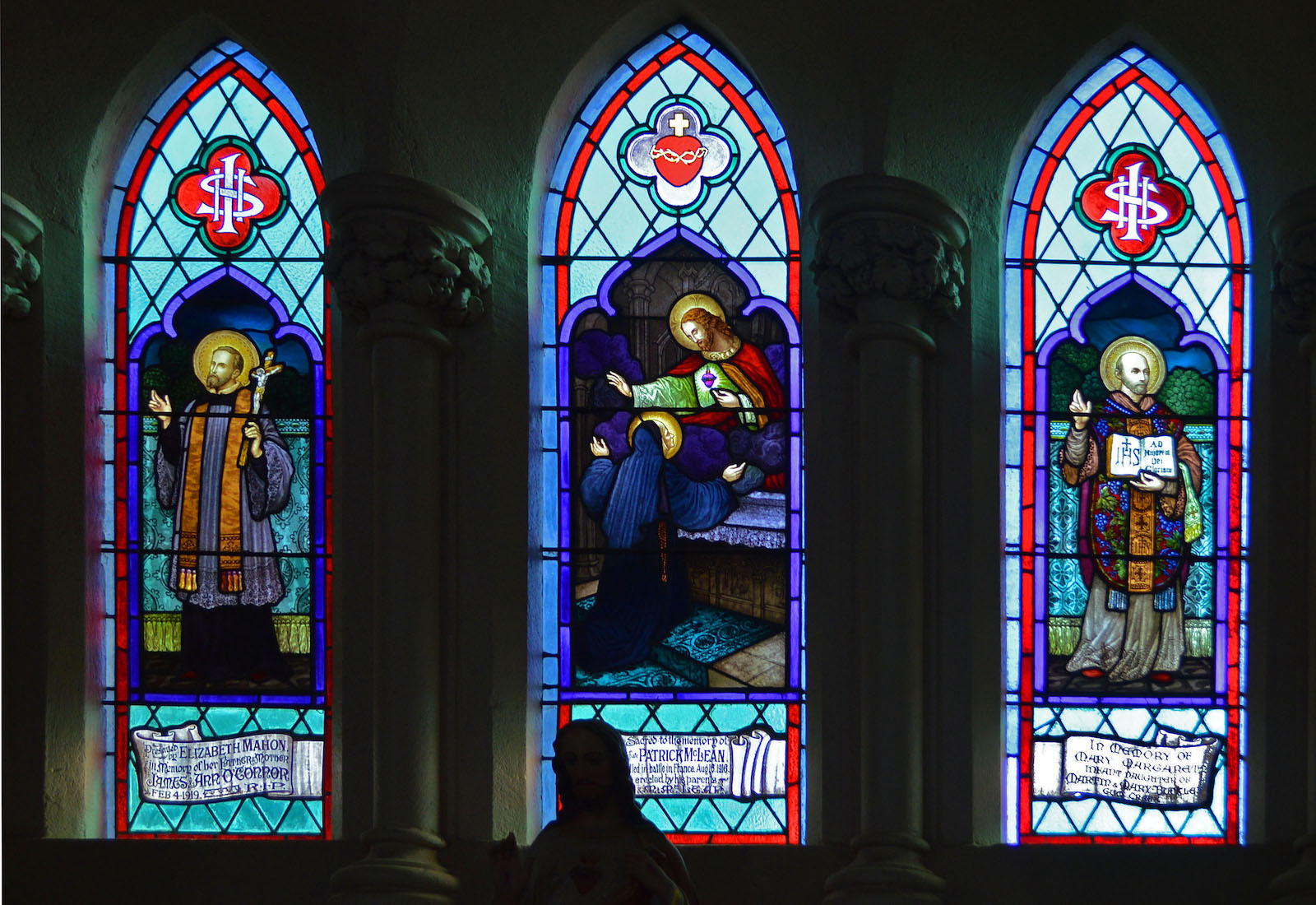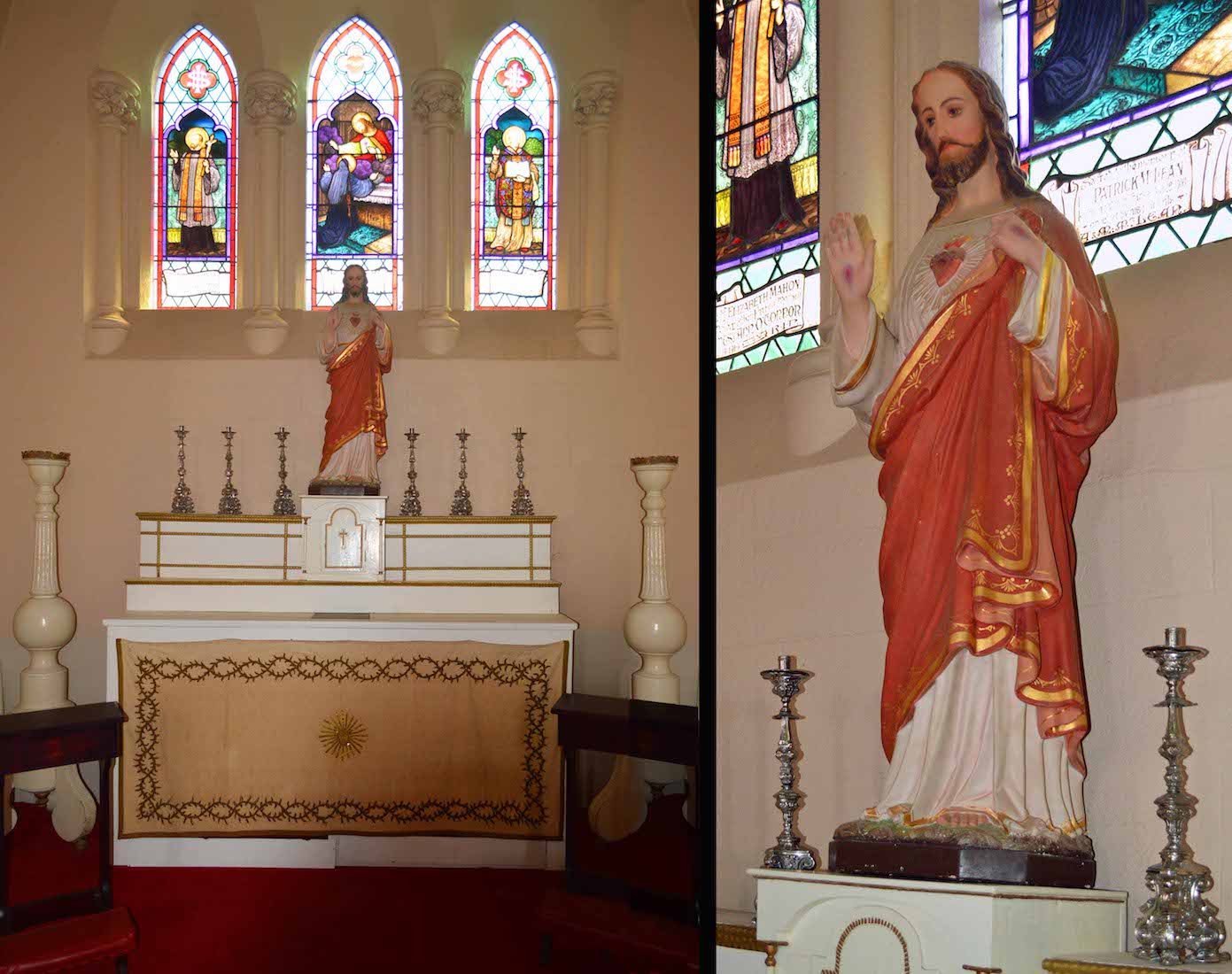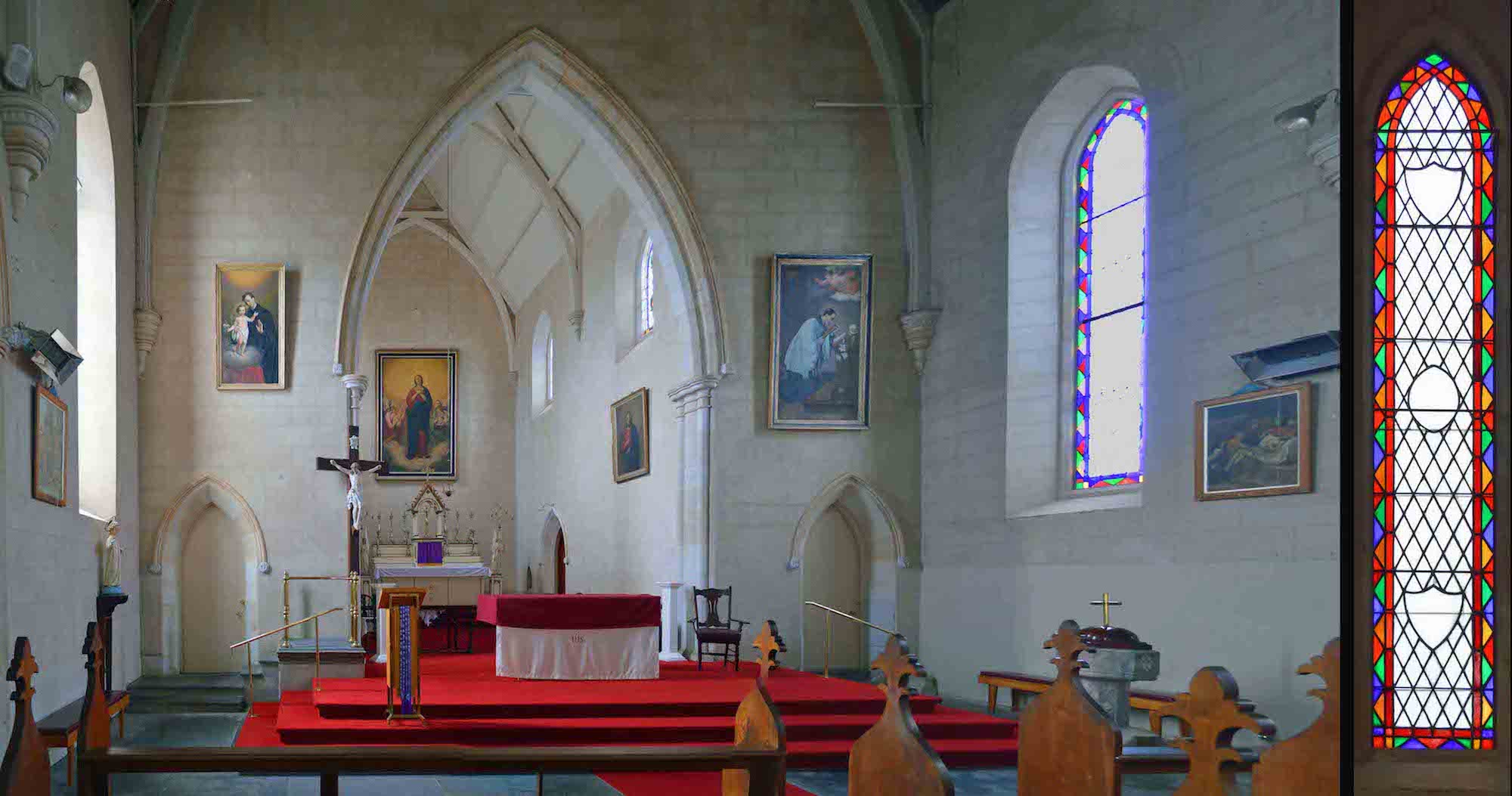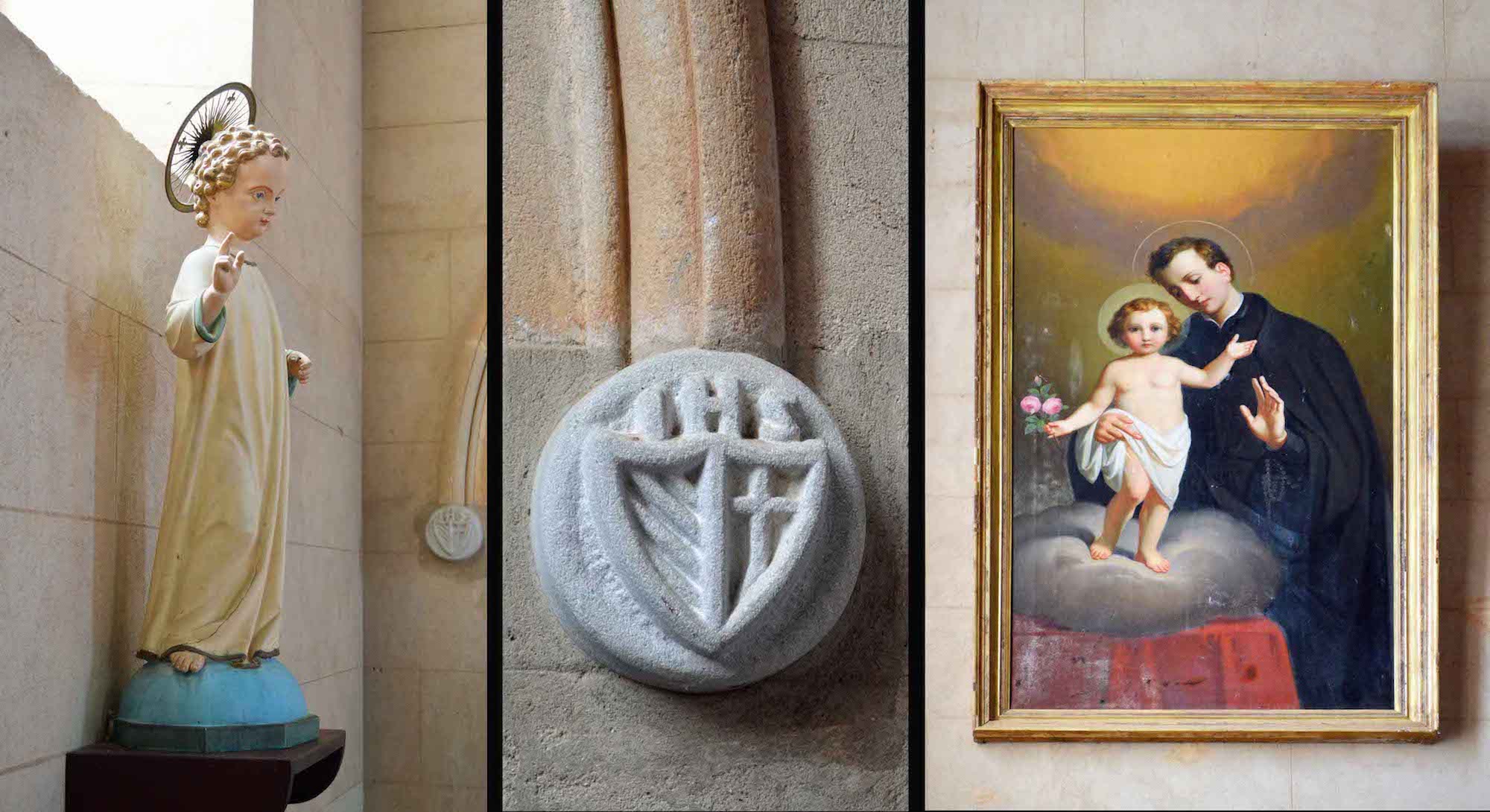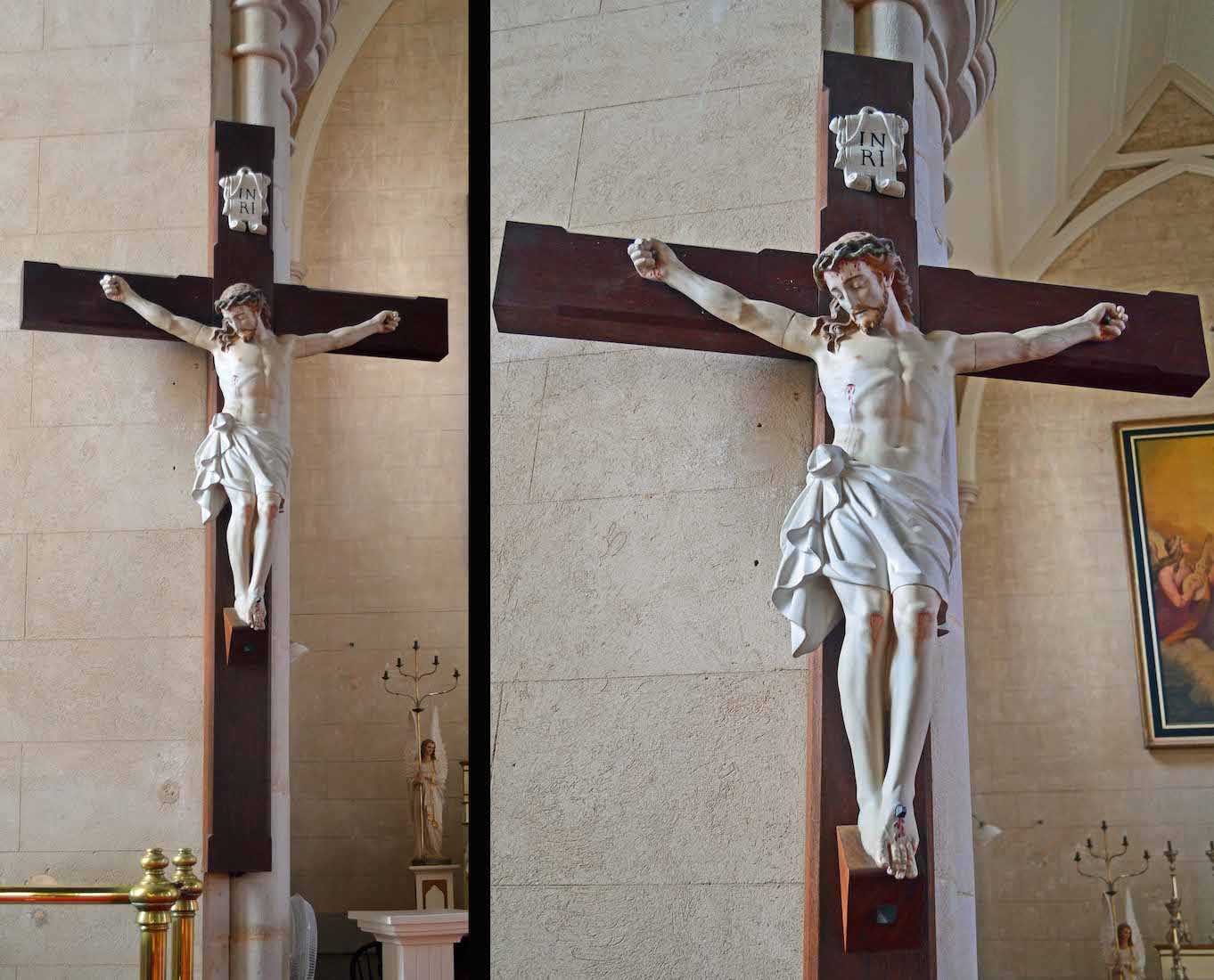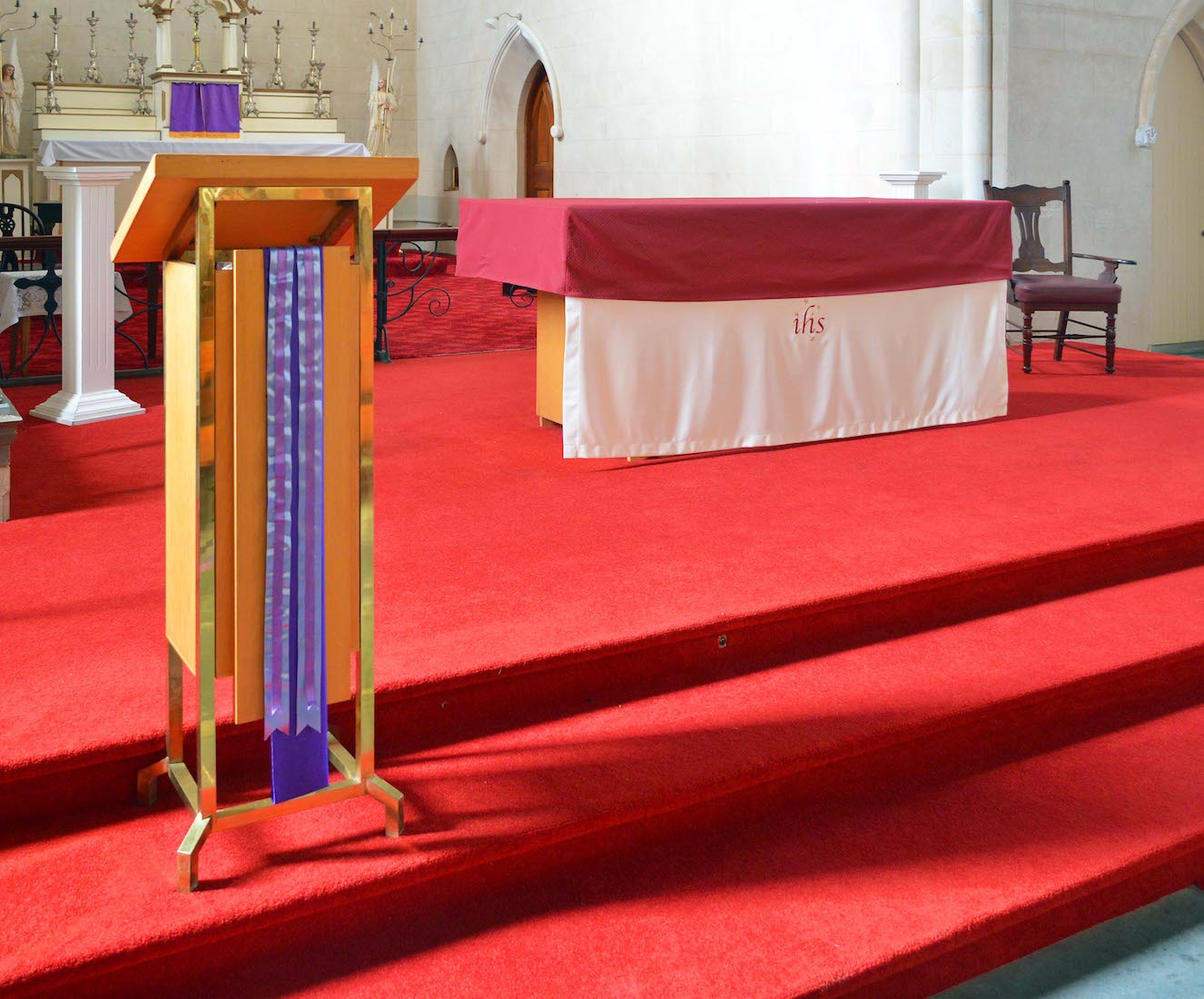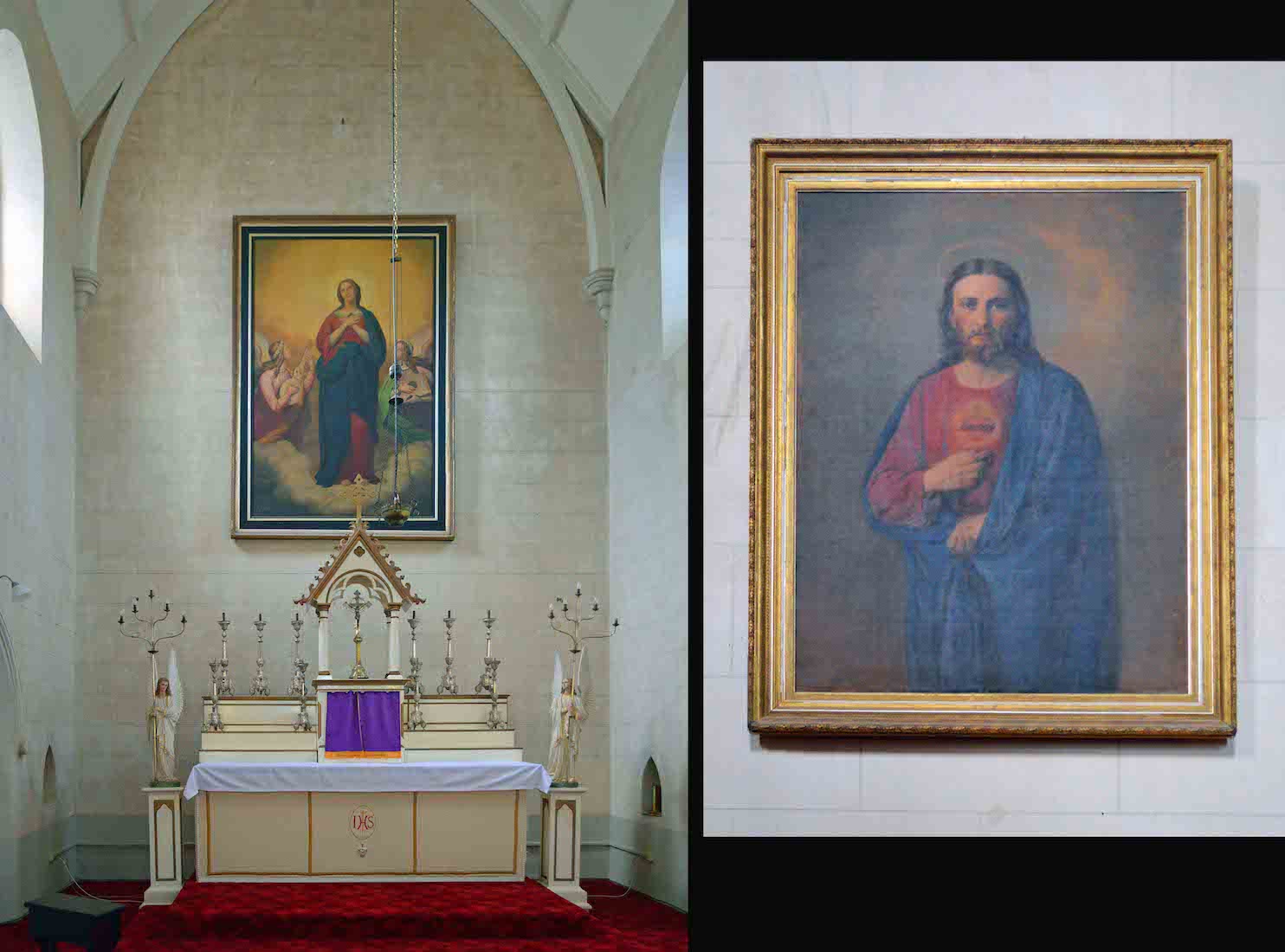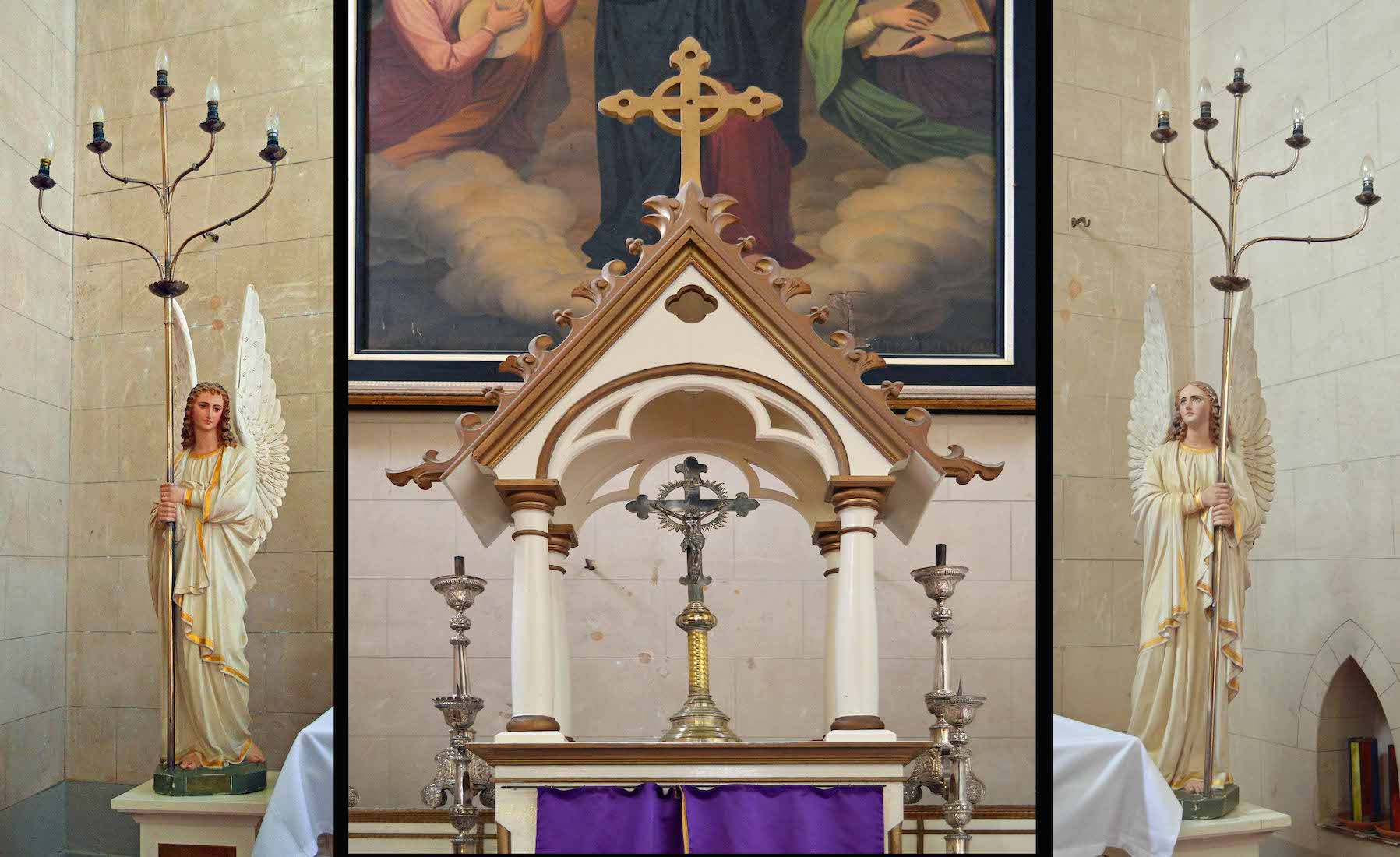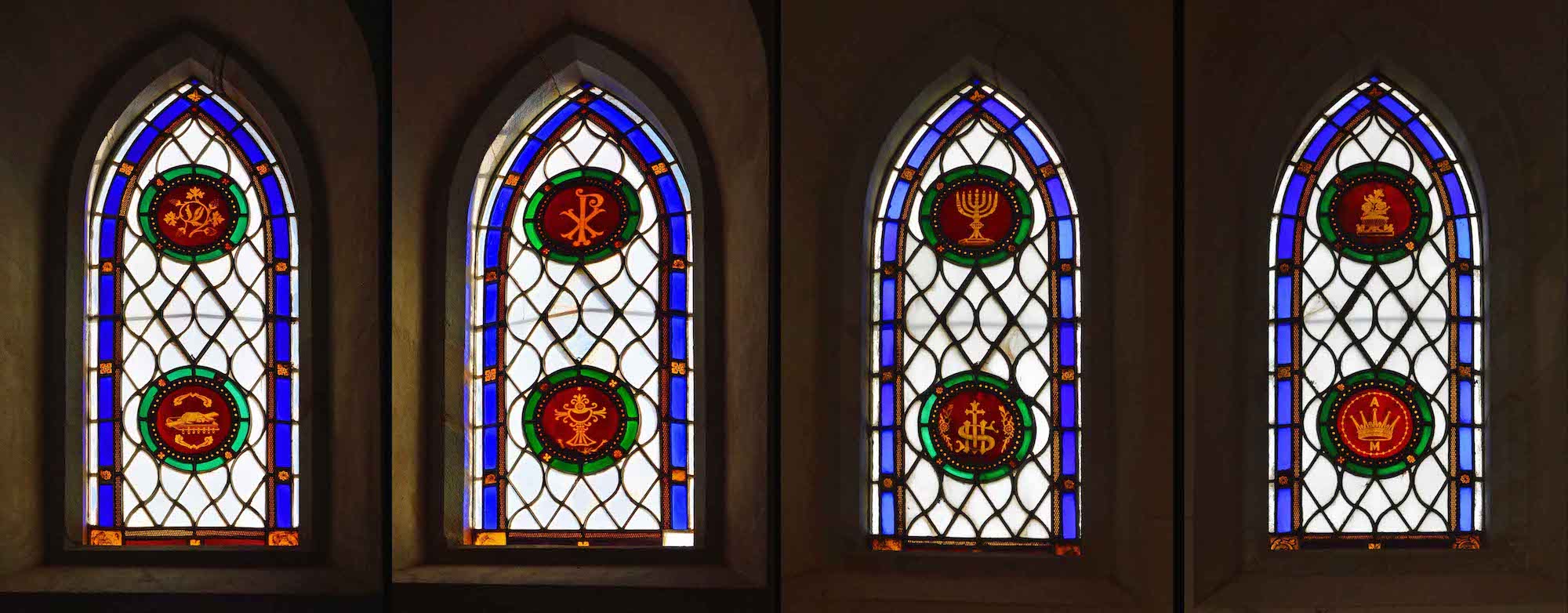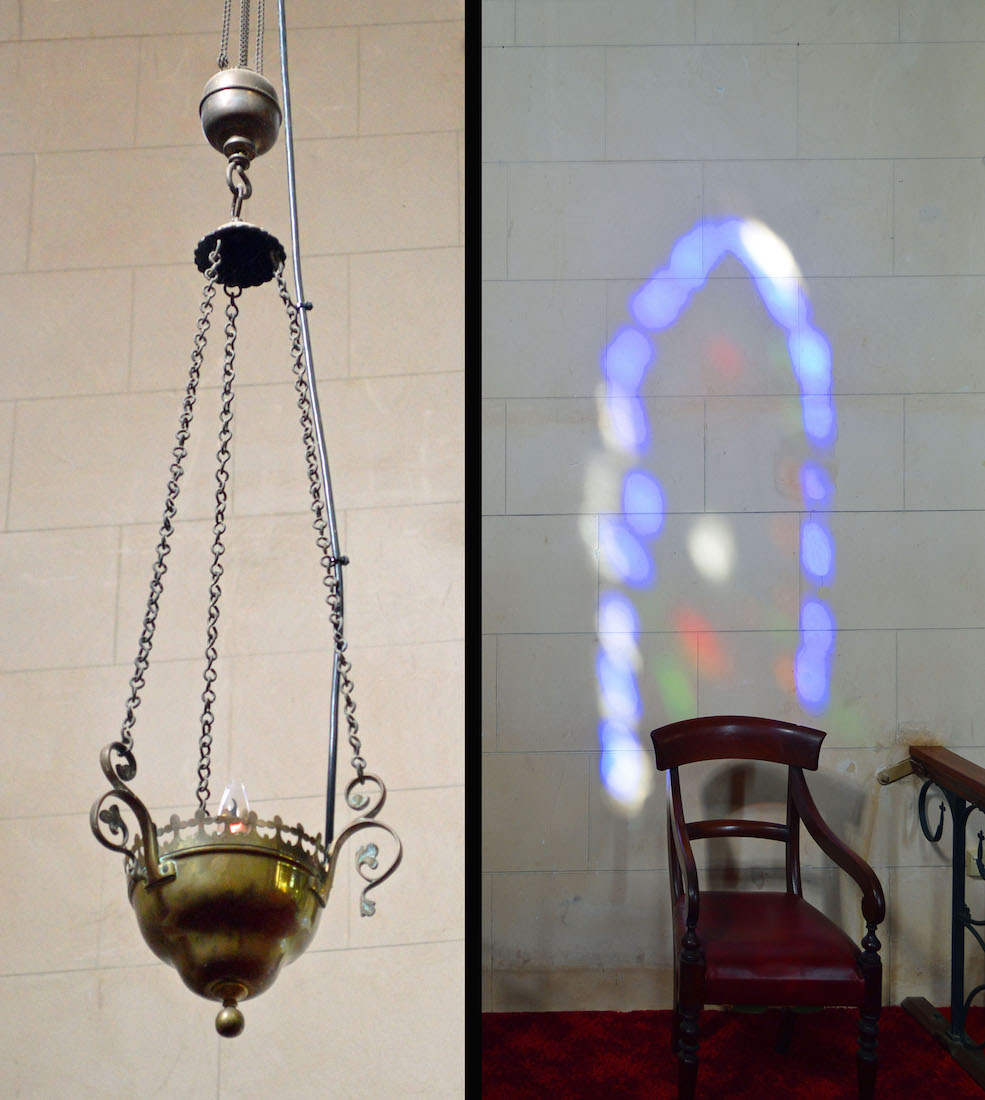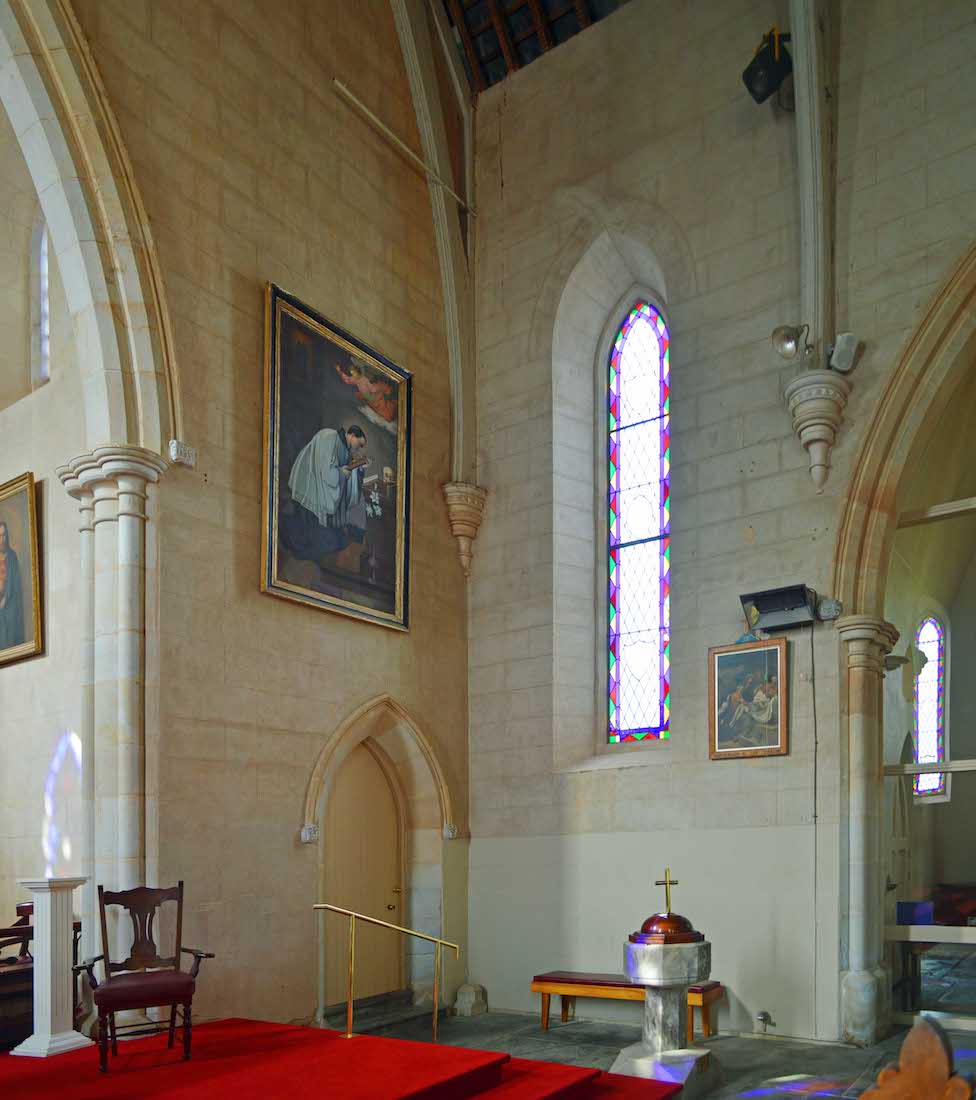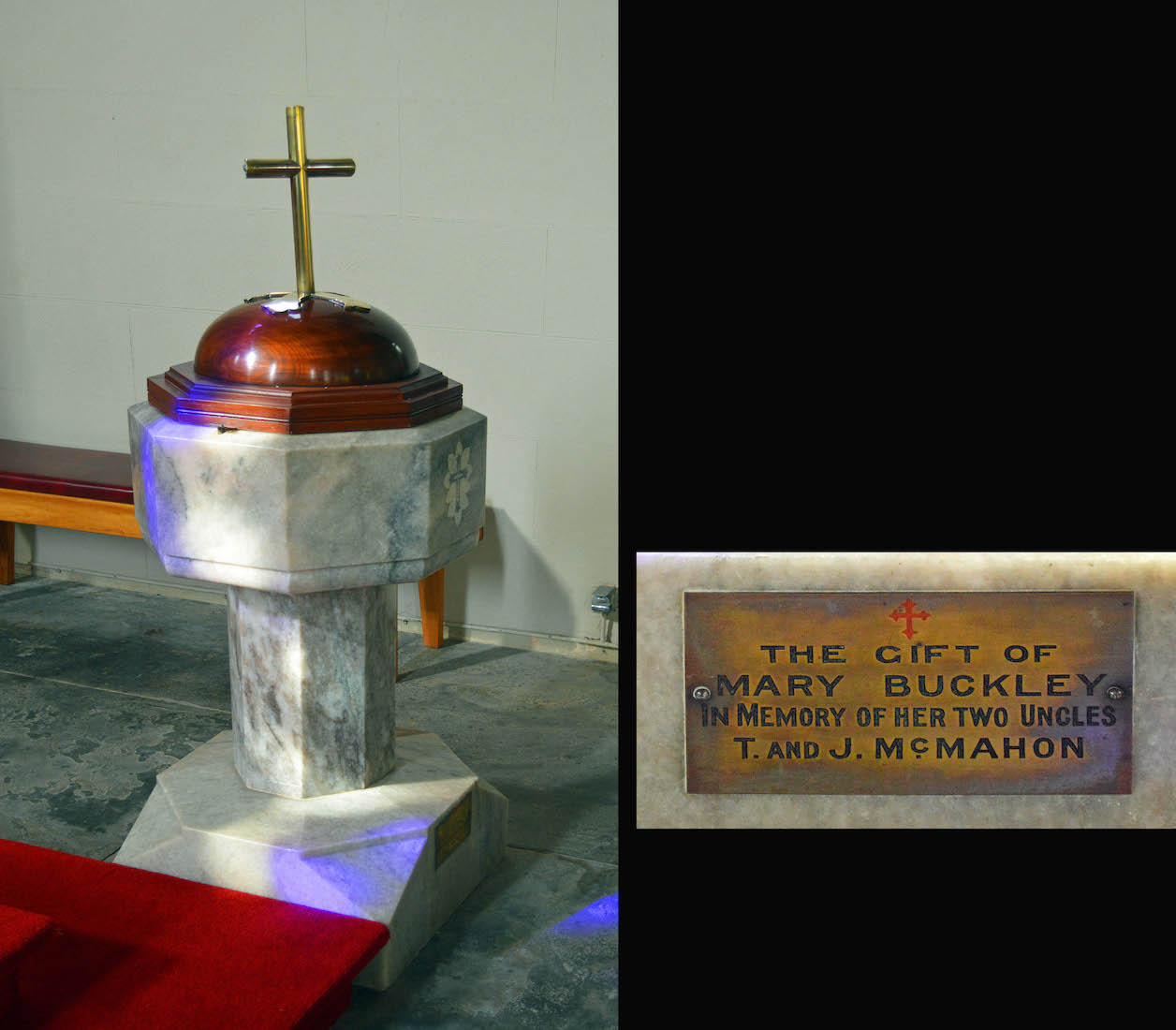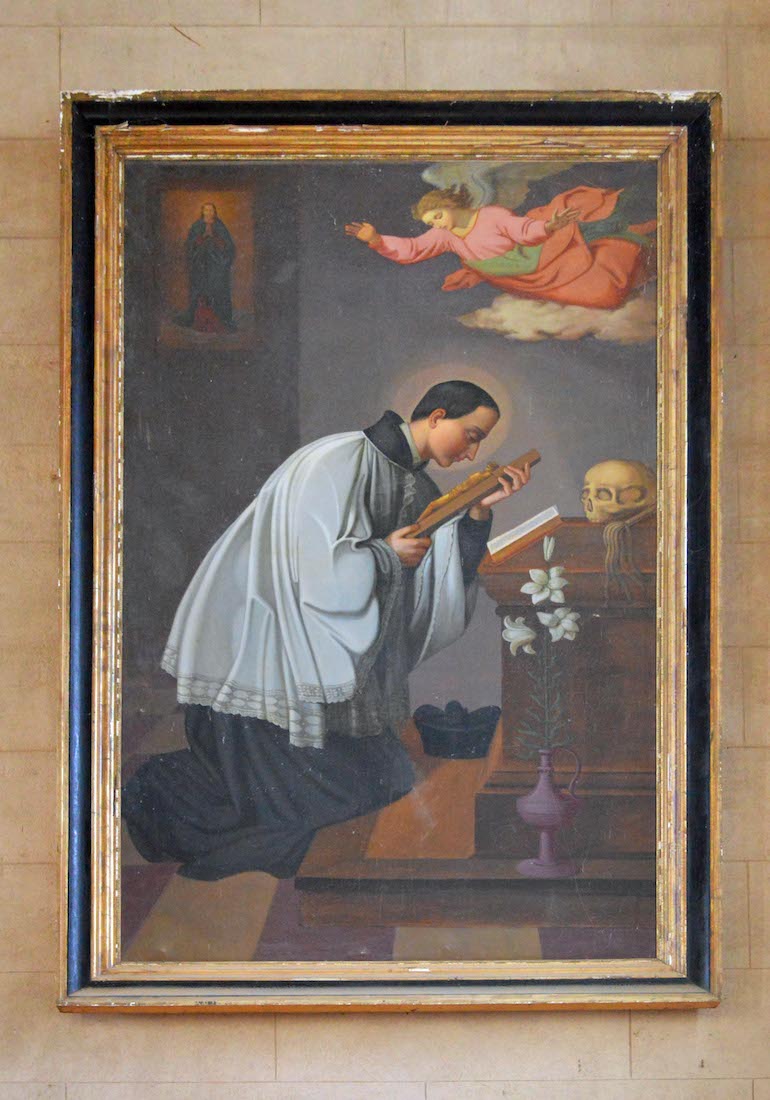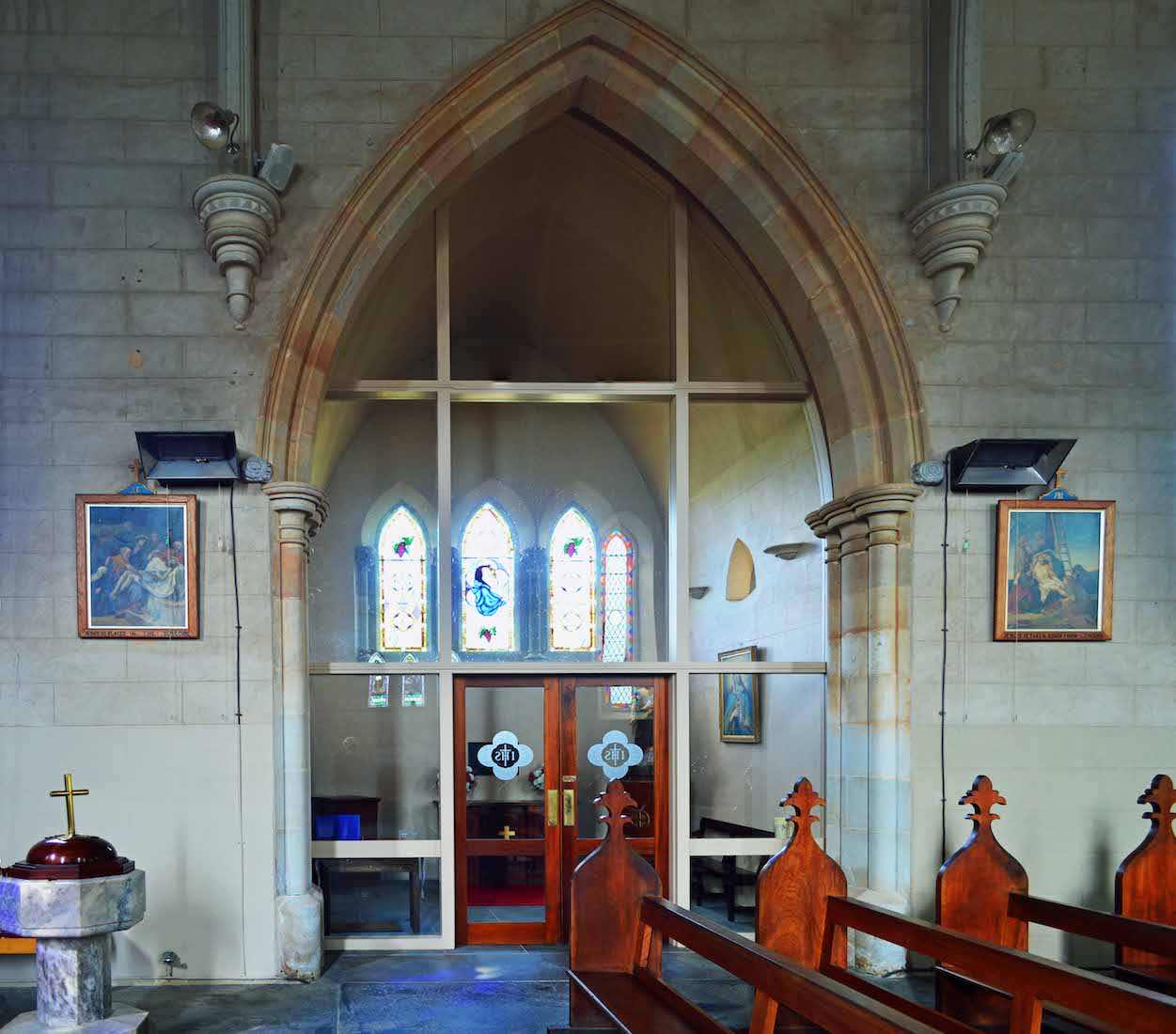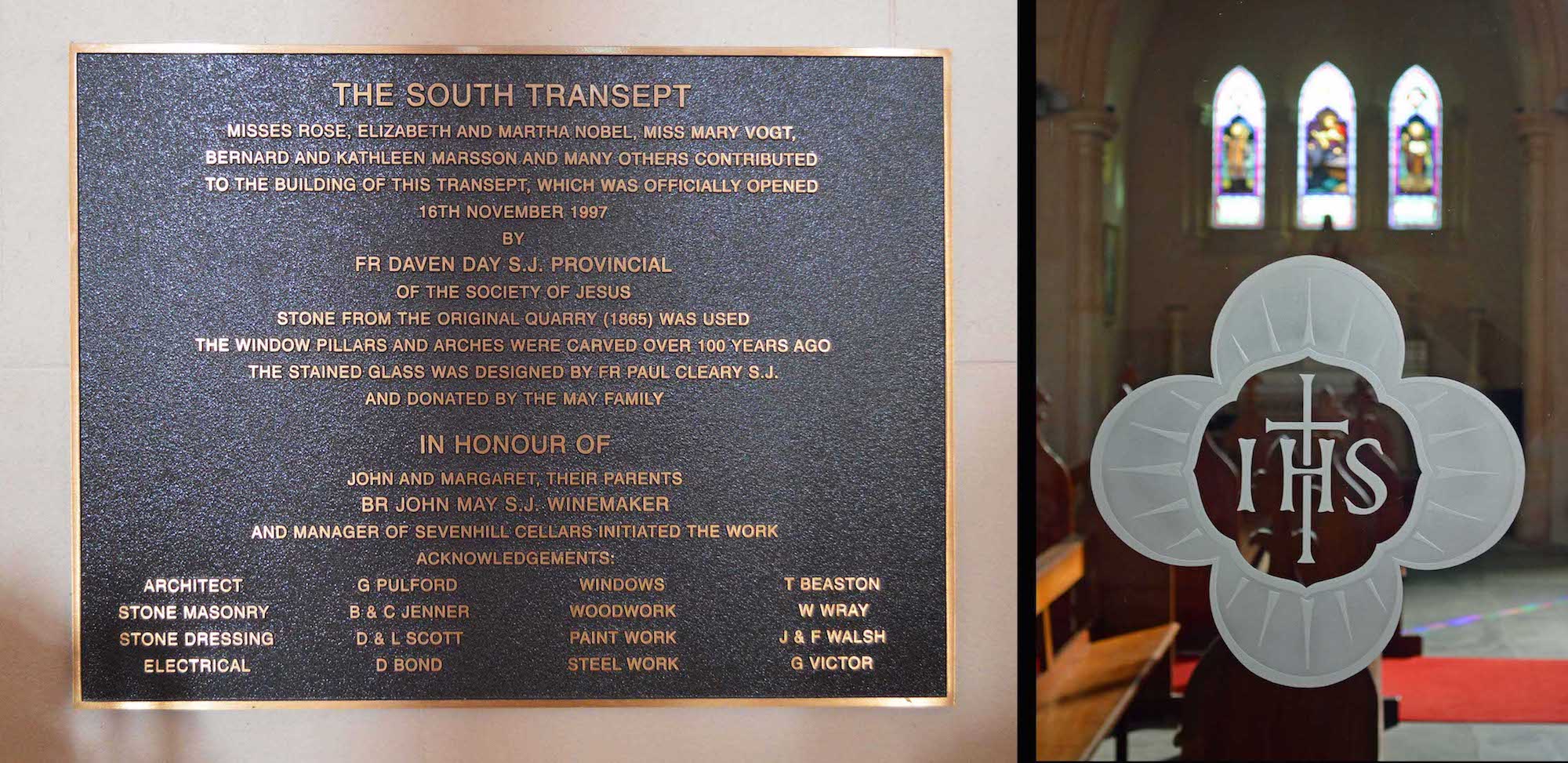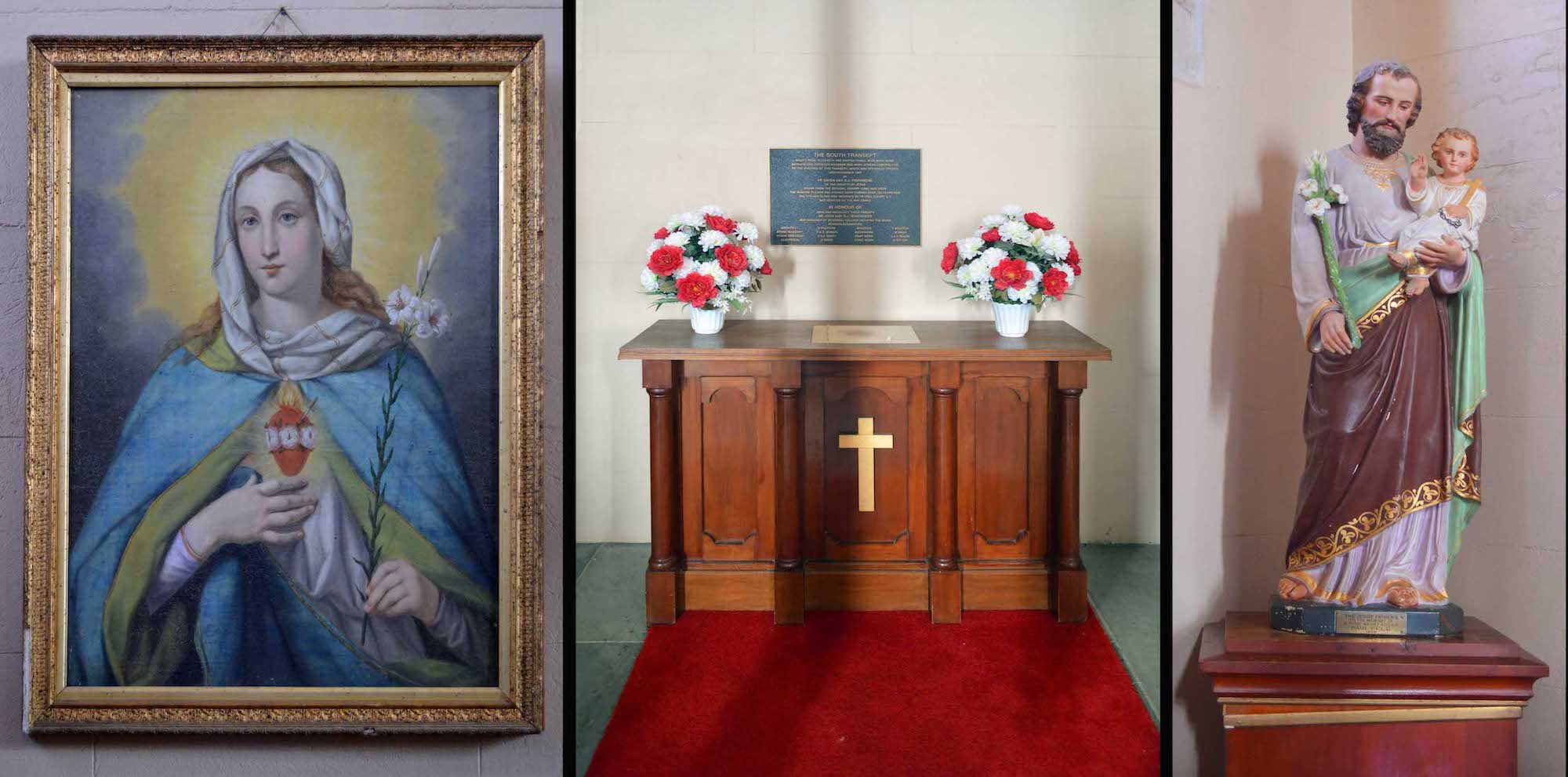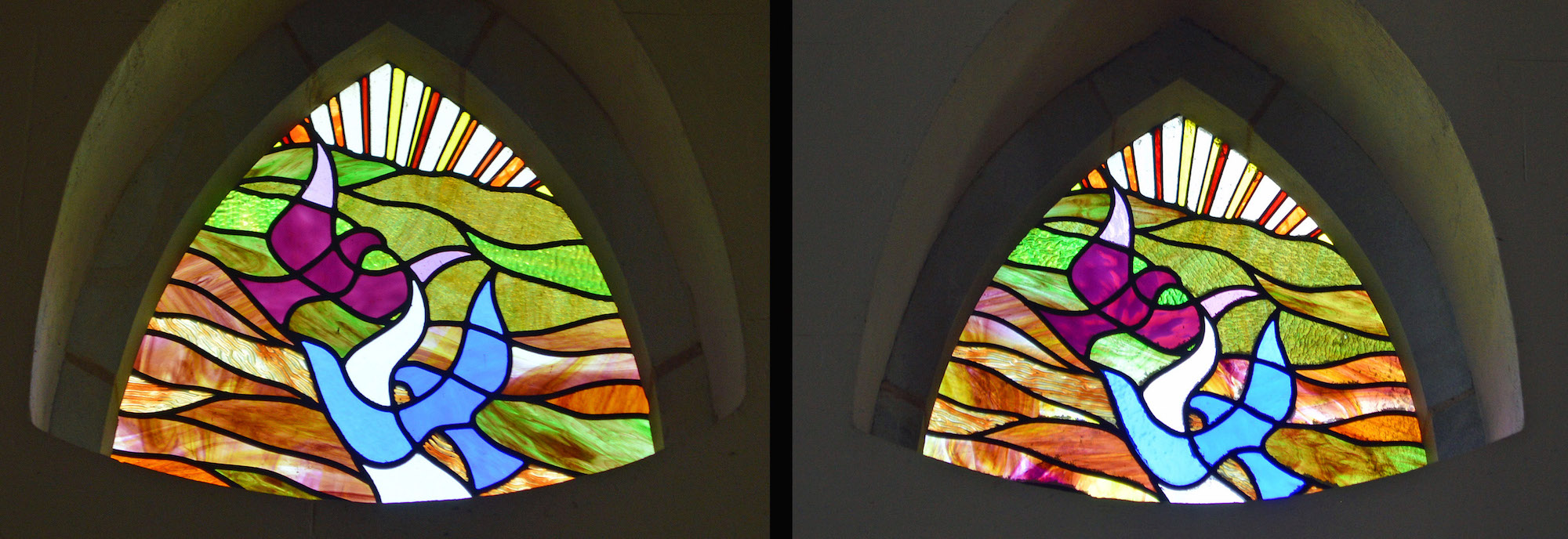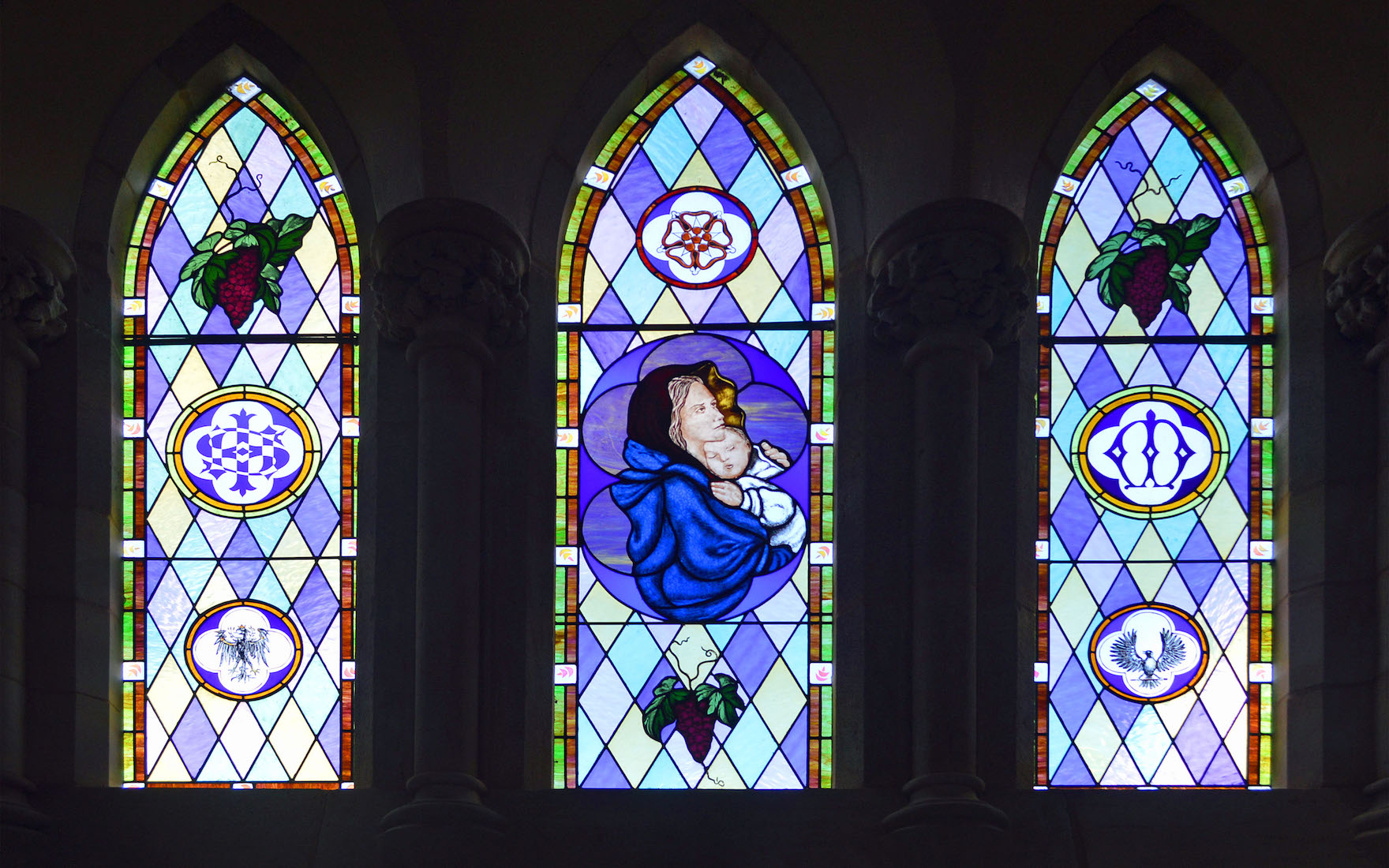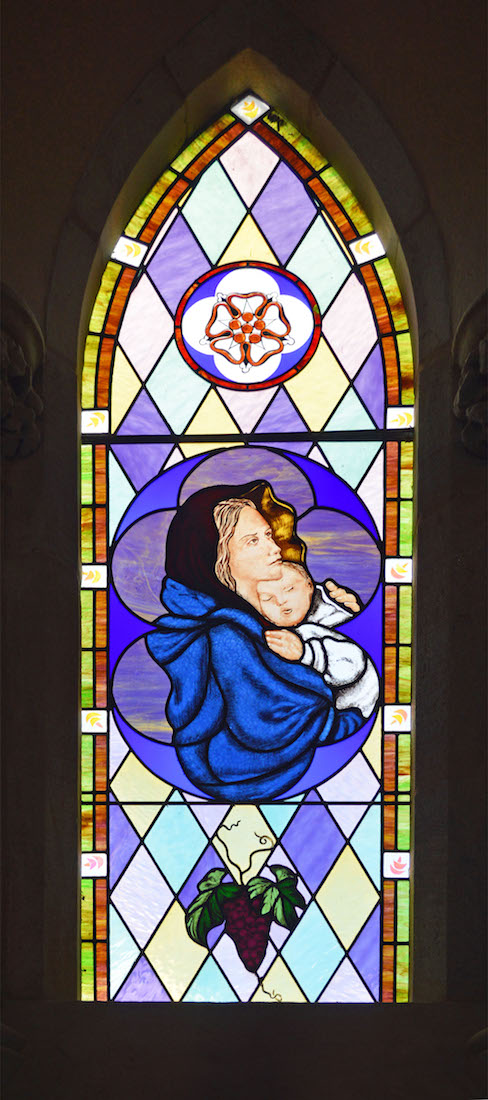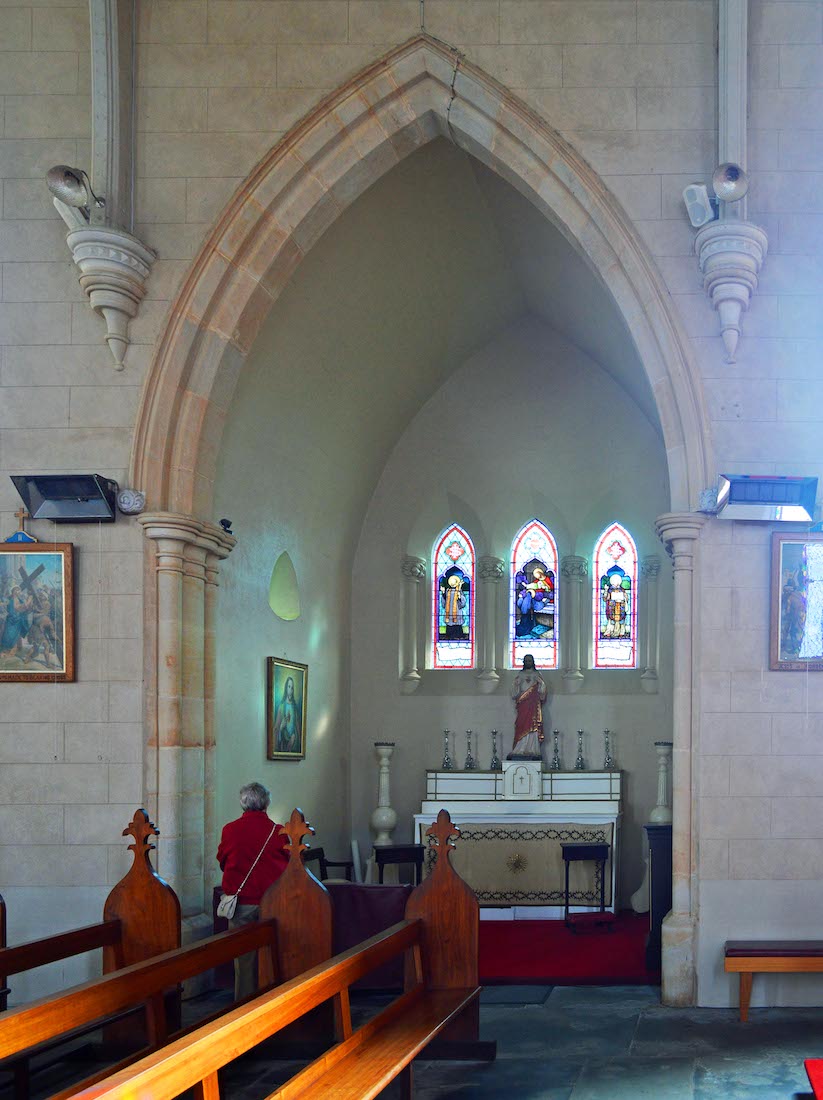
The so-called North transept is used as the Sacred Heart Chapel. Even from this distance we can see the altar and a row of special windows. INDEX
22. SACRED HEART
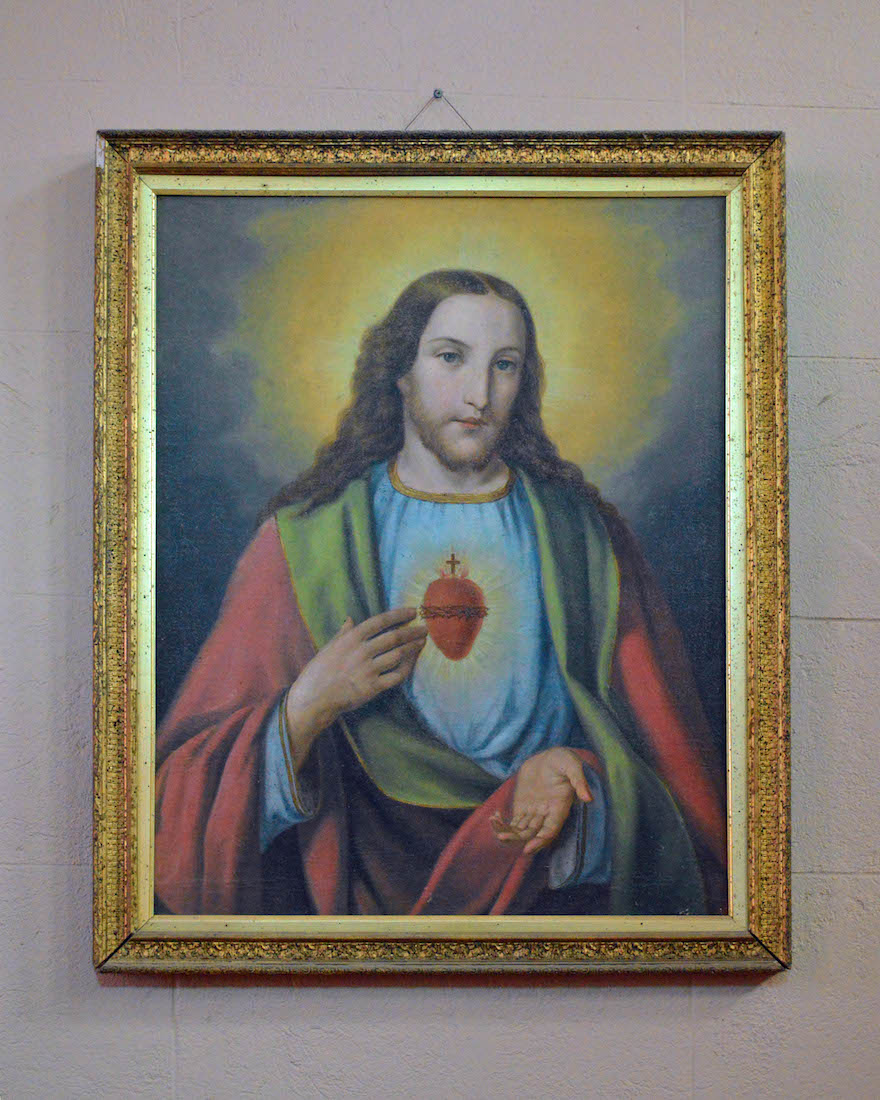
The painting on the West wall of the chapel shows Jesus pointing to his heart. The devotion to the Sacred Heart is one of the most widely practiced and well-known Roman Catholic devotions, taking Jesus Christ’s physical heart as the representation of His divine love for humanity.
23. CHAPEL WINDOWS
The three windows in this chapel are not identified, but probably all have Catholic significance. I might guess that the central pane shows St Margaret Mary Alacoque, to whom Jesus is said to have revealed teaching about the Sacred Heart. And the panel at right with its obvious Jesuit symbolism may depict St Ignatius.
24. CHAPEL ALTAR
The chapel altar supports the figure of The Sacred Heart. The Sacred Heart is often depicted in Christian art as a flaming heart shining with divine light, pierced by the lance-wound, encircled by the crown of thorns, surmounted by a cross, and bleeding. Sometimes the image is shown shining within the bosom of Christ with his wounded hands pointing at the heart. The wounds and crown of thorns allude to the manner of Jesus’ death, while the fire represents the transformative power of divine love.
25. EAST NAVE
Leaving the Sacred Heart chapel we turn to the East nave and sanctuary. There are various items here which we shall look at in detail. The window at right is typical of the nave windows.
26. NORTHEAST NAVE
Closest to us are three items of interest. On the wall at left it the Boy Jesus shown standing on a globe in a position of authority. Images of this type have appeared since the Middle Ages – for example, The Infant Jesus of Prague in the 16th Century. I do not know the meaning of the little shield at the end of the arch. As for the painting: my guess is St Anthony, with his meeting the Christ Child who visited him in his cell.
27. CRUCIFIX
The large crucifix is a reminder that this Christ died on the Cross in my place. We rejoice that he rose again and lives today!
28. AMBO AND NAVE ALTAR
Looking across the front of the nave we observe the ambo (or lectern), and beyond, the nave altar. Long ago, churches only had a high altar against the East wall, but since Vatican II in the 1960s, the nave altar has been introduced, closer to the congregation, and such that the officiating priest faces the congregation.
29. SANCTUARY PAINTINGS
There are a number of large paintings in this Church, but unfortunately few details. The painting at right, on the South wall of the sanctuary, is the Sacred Heart. I have no information about the painting over the high altar.
31. SANCTUARY HIGH WINDOWS
High up in the sanctuary are four latticed windows, each with two circular images. Pictured here are various Christian symbols: a chalice, grapes, a crown, a Chi-Rho symbol, a Jesuit IHS symbol, a menorah, a vase of roses(?), and a sacrifice image.
32. SANCTUARY LAMP AND ‘HALO’!
Also above the sanctuary is the traditional lamp, indicating the presence of the reserved Elements of the Eucharist. One of the sanctuary chairs also gets a special light treatment!
33. SOUTHEAST NAVE
We turn to the Southeast nave where the baptismal font stands. There is another large painting on the wall here.
34. FONT
The Catholic Church believes that baptism is the rite of initiation into the Church. Baptism takes place in this font with the sprinkling of holy water. This font was the gift of Mary Buckley.
35. PAINTING
This is another unattributed painting, presumably showing a Jesuit brother in prayer and devotion.
36. TO THE LADY CHAPEL
We come finally to the recently added South transept which is the home of the Lady Chapel.
37. PLAQUE AND DOORS
Directly above the chapel altar is this plaque. It contains interesting details about the building of this transept which was opened in 1997. Interestingly, the window pillars and arches were carved over 100 years ago. Looking back outwards through the glass doors, we see again the Jesuit IHS symbol.
38. WITHIN THE CHAPEL
At centre is the simple chapel altar, and at right a statue of St Joseph holding the Child Jesus, and his identifying sprig of lilies, following an ancient story. At left (and on the West wall of the chapel) is a painting of Mary and the Sacred Heart. The Immaculate Heart of Mary is a devotional name used to refer to the interior life of the Blessed Virgin Mary, her joys and sorrows, her virtues and hidden perfections, and, above all, her virginal love for God the Father, her maternal love for her son Jesus, and her compassionate love for all people.
39. CHAPEL WINDOWS
The triangular windows in the side walls of the chapel have identical structure, but interesting variations in the glass. We might suggest doves (of peace) flying over a verdant landscape with a river, and the rising sun.
40. MARY WINDOWS
These windows require some interpretation! At centre are the Madonna and Child. The grape images are easily seen and appropriate. We also pick out the IHS and M monographs for Christ and Mary. Above the central picture is a rose, a flower associated with Mary. At bottom right we might have the State symbol, the piping shrike. But at left ... !
41. VIRGIN MARY AND CHILD
This completes our tour of the St Aloysius Church, and we take with us this final image.
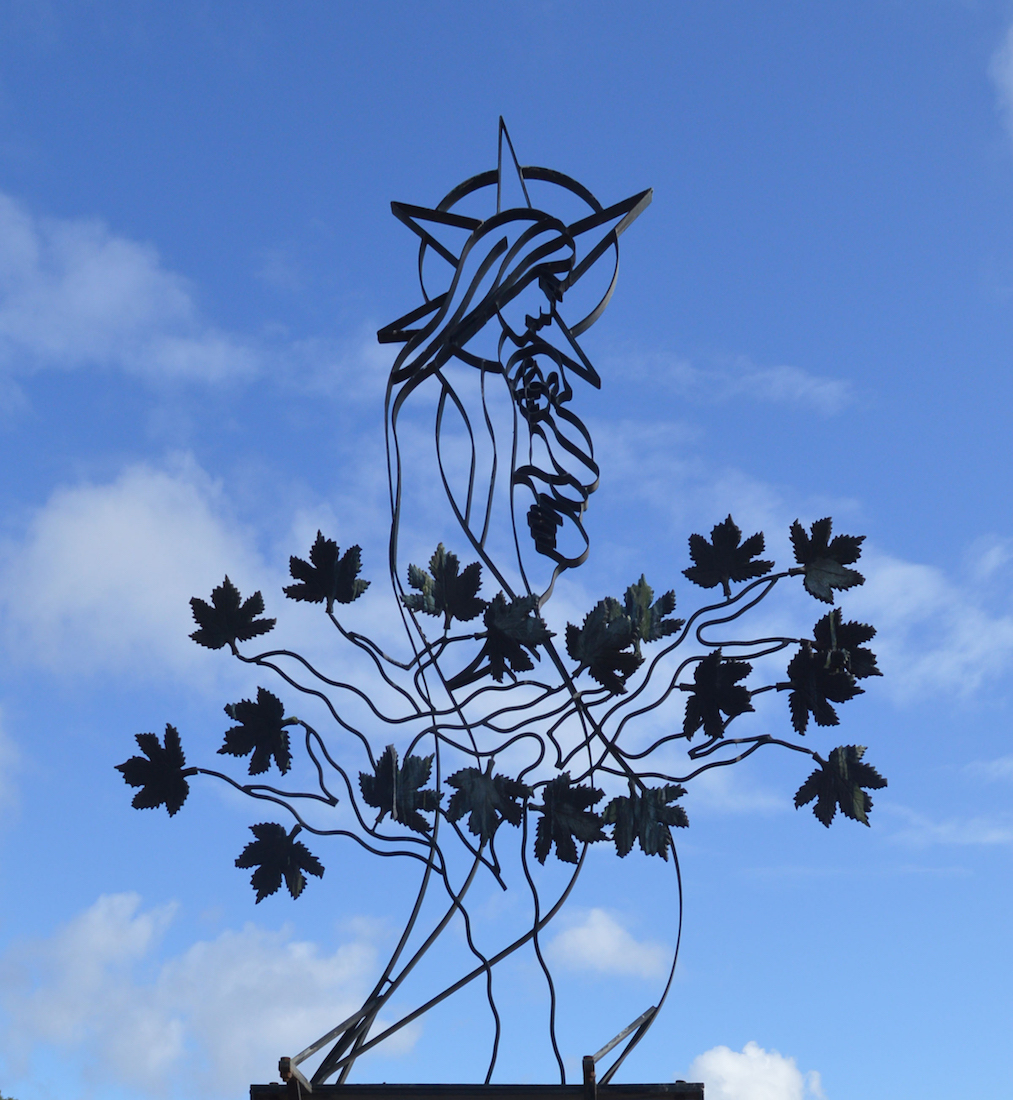
CONCLUSION
I hope you have enjoyed visiting St Aloysius’ Catholic Church, Sevenhill with me. I found it an interesting church in a delightful setting.
I am happy to receive constructive comments or corrections concerning this website. The best websites are the ones which have no errors! I am grateful to my wife Margie who came to Sevenhill with me, and who has proof-read these pages.
I could find little information online about this Church, but some facts can be found on
https://www.sevenhill.com.au/the-jesuits
The photographs which appear on this site can also be found in higher resolution at:
https://www.flickr.com/photos/paulscottinfo/albums/
Site created 04 / 2017 ; reformatted 01 / 2021
Paul Scott

